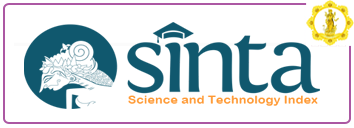Model Pembelajaran Kooperatif Tipe TGT (Team Game Tournament) dalam Pembelajaran Menulis dan Mengetik Aksara Bali pada Siswa Sekolah Menengah Atas/Kejuruan
DOI:
https://doi.org/10.25078/ds.v1i1.501Abstract
Writing and typing Balinese script is one of the materials in Balinese language which is considered difficult by most students, including high school/vocational high school students who logically repeat only the material they have obtained while sitting in elementary and junior high school. This paper seeks to explore the concept, application, and role of the TGT (Team Game Tournament) type of cooperative learning model in learning to write and type Balinese script in high school / vocational high school students with structural and behaviorism theory supported by content analysis and descriptive analysis methods. The results of the analysis show that the TGT type of cooperative learning model emphasizes on three main points, namely academic tournaments, quiz systems, and individual contributions in groups. In its application, the TGT type of cooperative learning model in learning to write and type Balinese script is able to bring the elements of solid teamwork, exciting games, and competitive academic tournaments into a single unit by using script cards and the application of Bali Simbar Dwijendra. This makes students able to learn while playing, so learning becomes very fun and meaningful for students. Through this learning model, students are trained to build mutual cooperation, sportsmanship, speed, and understand the material well through five main components, namely class presentations, teams, games, tournaments, and team recognition. In line with this, the TGT type of cooperative learning model in learning to type and write Balinese script also has a very important role, namely: creating an atmosphere of Balinese language learning to be fun, fostering a spirit of sporting competition, and strengthening cooperation and a sense of kinship between students.









